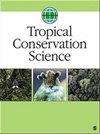Corrigendum to Not Just an Issue in Forested Regions: Investigating the Consumption and Trade of Pangolins in a Forest-Savannah Mosaic Area of Cameroon
IF 1.6
4区 环境科学与生态学
Q2 BIODIVERSITY CONSERVATION
引用次数: 1
Abstract
Cameroon hosts three species of pangolins and has recently been identified as a hub of pangolin trafficking. However, information on threats to pangolins needed to guide conservation efforts remains scarce, notably on consumption and trade patterns, and the prevalence of individuals trading pangolins. Local communities sharing the same habitats with pangolins can provide such information, which is useful to better target interventions. Based on a snowball sampling approach and using interview surveys in 20 villages surrounding Mbam et Djerem National Park, we investigated the consumption of pangolins and its drivers, parts sold, selling prices, places sold and buyers, and employed the nominative technique to estimate the percentage of people within the surveyed population engaged in selling pangolins. Our results showed that both giant and white-bellied pangolins are locally consumed, mainly for their taste, and traded for meat and scales. Distance to the capital city Yaoundé, ethnolinguistic group, and education significantly affected the likelihood of consuming or trading white-bellied and giant pangolins. Selling and prices of giant pangolin meat and scales were significantly affected by distance to Yaoundé. The prevalence of people selling white-bellied and giant pangolins were higher in Tibati and Yoko compared to other municipalities. Overall, our study provided information necessary for effective law enforcement and research-oriented decision-making for pangolin conservation. We recommend the establishment of consumption reduction campaigns focusing on taste preference, investigation of the impacts of the newly constructed national road on pangolin supply chains and trafficking, and increasing the involvement of local communities in the management process of Mbam et Djerem National Park.不只是森林地区的一个问题:调查喀麦隆森林-萨凡纳马赛克地区穿山甲的消费和贸易
喀麦隆拥有三种穿山甲,最近被确定为穿山甲贩运的中心。然而,指导保护工作所需的关于穿山甲威胁的信息仍然很少,特别是关于消费和贸易模式,以及个人交易穿山甲的普遍程度。与穿山甲共享同一栖息地的当地社区可以提供这类信息,这对更好地进行有针对性的干预是有用的。采用滚雪球抽样法,在Mbam et Djerem国家公园周边的20个村庄进行访谈调查,调查了穿山甲的消费量及其驱动因素、销售部件、销售价格、销售地点和买家,并采用名义法估算了调查人口中从事穿山甲销售的人口比例。我们的研究结果表明,巨型穿山甲和白腹穿山甲在当地都被消费,主要是为了它们的味道,并被用来换取肉和鳞片。与首都雅温都的距离、民族语言群体和教育程度显著影响了消费或交易白腹穿山甲和巨型穿山甲的可能性。大穿山甲肉和鳞片的销售和价格受距离瑶城的距离的显著影响。与其他城市相比,在提巴蒂和阳子,贩卖白腹穿山甲和巨型穿山甲的人更普遍。本研究为穿山甲保护的有效执法和研究型决策提供了必要的信息。我们建议开展以口味偏好为重点的减少消费活动,调查新建的国道对穿山甲供应链和贩运的影响,并增加当地社区对Mbam et Djerem国家公园管理过程的参与。
本文章由计算机程序翻译,如有差异,请以英文原文为准。
求助全文
约1分钟内获得全文
求助全文
来源期刊

Tropical Conservation Science
BIODIVERSITY CONSERVATION-
CiteScore
3.60
自引率
5.90%
发文量
16
审稿时长
>12 weeks
期刊介绍:
Tropical Conservation Science is a peer-reviewed, open access journal that publishes original research papers and state-of-the-art reviews of broad interest to the field of conservation of tropical forests and of other tropical ecosystems.
 求助内容:
求助内容: 应助结果提醒方式:
应助结果提醒方式:


